The respected members of the oncology community listed here are among some of those who passed away in 2022–2023. The ASCO Post remembers them, their lives, and their contributions to cancer research and treatment.
Robert J. Gillies, PhD
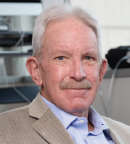
Robert J. Gillies, PhD
Moffitt Cancer Center and the global research community lost a great leader, scientist, and collaborator with the passing of Dr. Gillies, who died on June 7, 2022, after an extended illness. He was 69 years old. His recruitment in 2008 elevated Moffitt’s scientific stature, and his vision and work over the past 14 years made an indelible mark on the cancer center’s success and helped pave the way for its future.
Dr. Gillies was an exceptional and fearless investigator whose pioneering work spanned molecular, cellular, and animal studies; clinical trials; and image analytics. One key area was his work establishing that the pathophysiologic microenvironment of early cancers is hostile, where it exerts evolutionary selection for the outgrowth of malignant clones and contributes to genomic plasticity and the heterogeneity of solid tumors. Given these findings and many others from his group, Dr. Gillies believed cancers could be understood only through the lens of Darwinian evolution and helped lead the field of cancer evolution to its current prominence.
These studies also led Dr. Gillies to launch transformative studies that focused on functional and molecular imaging of cancer, specifically with an emphasis on the use of imaging to inform evolutionary models of carcinogenesis and response to therapy. His work developed the field of radiomics, where one can extract minable data from quantitative features of medical images. His radiomics research, specifically in lung cancer, has helped to improve screening and diagnosis, as well as guide clinical decision-making and outcomes monitoring. Often referred to as the “Father of Radiomics,” his vision was for radiomics to be part of the standard clinical workflow in oncology.
Dr. Gillies’ work has and will continue to have a lasting impact on cancer research and clinical practice. During his nearly 50-year career, he published more than 400 peer-reviewed articles, many of which were firsts in his field:
- First to grow and maintain cancer cells at high density in a nuclear magnetic resonance-compatible bioreactor
- First to show the extracellular, and not the intracellular, pH of solid tumors was acidic in vivo
- First pH image of a tumor
- First to show that neutralizing pH could reduce metastases and improve immune therapy
- First to propose a physiologically relevant evolutionary model of carcinogenesis
- First to define radiomics as a discipline.
Originally published on moffitt.org. Adapted with permission from Moffitt Cancer Center.
Isaac Craig Henderson, MD
Dr. Henderson died at age 81 at his home in San Francisco on December 26, 2022, after a brief illness. Dr. Henderson was an internationally known medical oncologist who specialized in breast cancer, beginning his career at Harvard’s then-designated Sidney Farber Cancer Institute (now the Dana-Farber Cancer Institute; DFCI) in Boston. He made substantial conceptual and leadership contributions to the translational and clinical research, evaluation, and treatment of this disease over the past 5 decades.
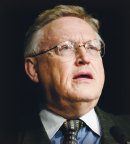
Isaac Craig Henderson, MD
Dr. Henderson received his undergraduate degree in history and chemistry from Grinnell College in Iowa in 1963, for which he later served on the Board of Trustees and by which he was honored with an Alumni Award and an honorary Doctor of Science. He received his MD degree (1970) and completed his residency in internal medicine at Columbia University in New York City and served a postdoctoral laboratory fellowship at the National Institute of Health. He completed a fellowship in medical oncology at the DFCI and joined the faculty there, where he was Director of the Breast Evaluation Center for more than a decade. In 1992, he became Chief of the Division of Medical Oncology and Deputy Director of the Cancer Center at the University of California San Francisco (UCSF). With his long-time colleague, Joe Gray, PhD, he was the inaugural Co-Director of one of the first five Specialized Programs of Research Excellence (SPORE) in breast cancer. He was Adjunct Professor of Medicine at UCSF until his death.
Dr. Henderson left academia to join the health-care industry, initially as Chief Executive Officer and Chair of the Board of Directors of SEQUUS, and subsequently with ALZA, and then with ACCESS Oncology Inc. (merged later with Keryx Biopharmaceuticals), and PrognosDx Health.
Dr. Henderson believed physicians have a humanistic side, teaching medical students and young doctors they “should have an intense interest in all things human, including emotions, so they can appreciate their patients’ subjective responses to treatment.” He lived what he taught, having spent 2 years in India on a Fulbright Scholarship. He was also a devotee of opera and served on the Board of Directors of the San Francisco Opera as well as provided medical advice to many of the cast members for several years.
Originally published in a communication by the Early Breast Cancer Trialists’ Collaborative Group; adapted and republished with permission.
Saul A. Rosenberg, MD, FASCO
For an academic oncologist, there is no greater reward than to be part of the clinical research that turns a fatal cancer into a treatable disease. Dr. Rosenberg was one such researcher who pioneered advances in the diagnosis, treatment, and understanding of lymphoma, including his work in spearheading interdisciplinary clinical investigations on chemotherapy dosage and minimal radiotherapy. His innovative approach to research has been adopted by scientists around the world, and his discoveries served as a foundation for the development of new therapies for lymphoma. Dr. Rosenberg died on September 5, 2022. He was 95 years old.
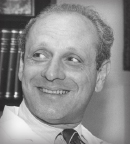
Saul A. Rosenberg, MD, FASCO
The Cleveland native applied to the School of Medicine of Western Reserve University (now Case Western Reserve University) only to be rejected on the grounds that the school’s quota of three Jewish students was already filled. At 22, Dr. Rosenberg reapplied for medical school but was once again rejected; instead, he was assigned to the atomic energy research laboratory in Cleveland. His initial task was to teach radiation oncologists to use radioisotopes, which ultimately propelled his career toward radiotherapy.
After 2 years in the atomic energy lab, Dr. Rosenberg was finally accepted into the School of Medicine of Western Reserve University. A junior residency at Boston’s Peter Bent Brigham Hospital was followed by service in the Korean War as a battalion surgeon. Afterward, he received a fellowship to Memorial Sloan Kettering Cancer Center and later returned to Brigham for 3 years, eventually becoming Chief Resident in Medicine.
Dr. Rosenberg made Stanford University his academic and research home for nearly 6 decades, during which his collaboration with Henry Kaplan, MD, changed the treatment paradigm of lymphoma, showing that treatment for Hodgkin lymphoma could be curative rather than strictly palliative. The L-1 and L-2 studies at Stanford served as some of the earliest randomized clinical trials in cancer and found that higher doses of radiation administered to a wider field improved survival rates for patients with localized Hodgkin lymphoma. With these data, Dr. Rosenberg and colleagues established total lymphoid irradiation as the standard of care in early-stage disease for decades.
Dr. Rosenberg credited Vincent T. DeVita, MD, FASCO, for “forcing” him to become an active ASCO member, and in 1982, after several years of working on various steering committees, Dr. Rosenberg was elected as ASCO’s President. About 2 years after his presidential term, Dr. Rosenberg received the David A. Karnofsky Memorial Award from ASCO and was named an ASCO Fellow in 2007.
Nicholas J. Vogelzang, MD, FACP, FASCO
Dr. Vogelzang, an expert in the treatment of patients with renal cell carcinoma, died on September 20, 2022. Dr. Vogelzang was 72 years old.
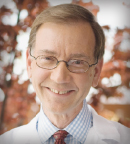
Nicholas J. Vogelzang, MD, FACP, FASCO
Born on December 13, 1949, in Holland, Michigan, Dr. Vogelzang was the oldest of seven children in a close-knit family guided by the values of the Christian Reformed Church. He attended Trinity Christian College, received his medical degree from the University of Illinois at Chicago, and completed his internship and residency in internal medicine at Rush University Medical Center. Early exposure to patients with cancer and the scientific challenges posed by the field fueled his passion for oncology, which accelerated during a fellowship in medical oncology at the University of Minnesota.
Early in his career, Dr. Vogelzang served as Professor of Medicine and Urologic Surgery at the University of Chicago, also serving as Chair of Genitourinary Oncology as well as Director for the University of Chicago Cancer Research Center. The many firsts of his career included being named the inaugural editor of the Textbook of Genitourinary Oncology, the first major textbook to center on the field from the joint perspectives of the molecular biologist, pathologist, oncologist, and urologist. He remained its lead editor until his retirement.
Dr. Vogelzang realized that his patients could derive certain benefits from meeting other patients with kidney cancer; in 1990, he was a cofounder of the National Kidney Cancer Association, later known as the Kidney Cancer Association (KCA). The KCA was the first organization of its kind in the United States, and Dr. Vogelzang served on its Board of Directors from its founding until his retirement in March 2022.
In 2004, Dr. Vogelzang became Head of Genitourinary Oncology and Clinical Professor of Medicine at the University of Nevada School of Medicine in Las Vegas and Reno. Dr. Vogelzang joined the Comprehensive Cancer Centers of Nevada in 2009 as a medical oncologist and became Director of the Nevada Cancer Institute. He would later also serve as Chair and Medical Director of the Developmental Therapeutics and Genitourinary Committees for US Oncology Research.
Dr. Vogelzang was a distinguished lecturer who authored or coauthored more than 400 journal articles, in addition to numerous book chapters and abstracts. He was the principal or co-principal investigator on multiple clinical trials that led to the regulatory approval of several new cancer therapeutics, including atezolizumab, pemetrexed, abiraterone, mitoxantrone, and radium-223 dichloride.
Jeffery Ward, MD, FASCO
Dr. Ward, who died on November 3, 2022, forged a career in oncology helping improve the quality of life for patients with cancer in Washington State and nationally, both through his clinical care and his advocacy and consensus-building on complex and controversial issues. This commitment to fully understanding every aspect of care and developing solutions was the guiding focus of his service both in his work as a medical hematologist and oncologist with the Swedish Cancer Institute. Dr. Ward also provided countless hours of service to ASCO; he served for 10 years as an associate editor of JCO Oncology Practice and for decades on numerous committees.
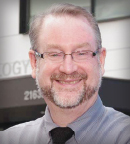
Jeffery Ward, MD, FASCO
Dr. Ward majored in microbiology at Brigham Young University, after which he enrolled at the University of Washington School of Medicine. He was an intern at the University of Minnesota Medical Center and stayed in Minnesota for his fellowship, afterward returning to Washington, where he joined a small private oncology practice in Edmonds. A few years later, the practice merged with another group and joined what is now US Oncology. They stayed with US Oncology for roughly 10 years before becoming a foundation practice supported by Swedish Medical Center and then a division of the Swedish Cancer Institute.
In addition, Dr. Ward served as Medical Director of Providence Hospice and Home Care of Snohomish County for 28 years. Founded in 1978, it provides comprehensive medical care in patients’ homes, helping them and their families work toward medical rehabilitation or a peaceful and dignified death.
Dr. Ward was diagnosed with mucosal melanoma in early 2022. After going through all treatment options, Dr. Ward chose to spend his remaining time with his family. “Cancer has been such a big part of my career, but now it has become an even bigger part of my life. I’ve given this consideration and have decided not to pursue a treatment that likely would have me spend much of the rest of my life in hotels and hospitals away from my home,” he said.
Dr. Ward’s positive impact in cancer care will be felt for decades to come—by his patients and their loved ones, his colleagues, and everyone who will benefit from the health-care policies he advocated for and helped bring to fruition.
Adapted from ASCO Connection, August 30, 2022. © 2022 American Society of Clinical Oncology. All rights reserved.
Lori Wilson, MD, FACS
The first woman to hold the position of Surgical Oncology Division Chief at Howard University Hospital, Dr. Wilson was also the first woman to be promoted to full Professor in Surgery at Howard University College of Medicine. Known as a fierce advocate for patients with cancer in underserved settings, and for her tireless work in developing prevention and screening programs for at-risk populations, Dr. Wilson was also a breast cancer survivor. Dr. Wilson died on October 14, 2022.
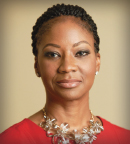
Lori Wilson, MD, FACS
Born on June 22, 1966, in Landstuhl, Germany, where her father served with the U.S. Air Force, Dr. Wilson attended Georgetown University as an undergraduate. She pursued her medical degree at Georgetown University School of Medicine. While in medical school, she had a career-forging experience, working with Soon-Myoung Park, MD, a noted pathologist whose research sought to determine which women would benefit from adjuvant chemotherapies.
Toward the end of medical school, Dr. Wilson chanced upon a lecture by the renowned cancer surgeon LaSalle Leffall, MD, which she described as a pivotal experience. “I wanted to follow in his huge surgical footsteps, and the only place to do that was at Howard University, where Dr. Leffall was Head of the Surgery Department.” Dr. Wilson matched at Howard and did her surgical residency along with 2 years of clinical research at the University of Cincinnati.
Dr. Wilson did a surgical fellowship at John Wayne Cancer Institute, where her surgical career experienced tremendous growth, including a global surgical outreach program in Swaziland, Africa (now known as Eswatini), which expanded her appreciation of underserved populations. She commented: “My time there taught me to view other cultures and their mores and beliefs with respect, which stayed with me throughout my career.”
Dr. Wilson returned to Howard University in 2011. In addition to her leadership role there, she also served on the Board of Directors for the American Cancer Society. She led twice-a-year medical missions to Africa, for which she received the Nelson Mandela Award from the United Nations.
Dr. Wilson was diagnosed with breast cancer in 2013. In December 2021, Dr. Wilson shared with attendees at the San Antonio Breast Cancer Symposium (SABCS) that in January 2019, shortly after celebrating her 5-year remission from disease, she had learned the breast cancer had returned and had metastasized. Dr. Wilson delivered a keynote lecture at the 2021 SABCS on advancing health-care equity built on trust.

